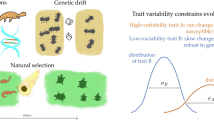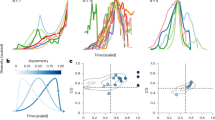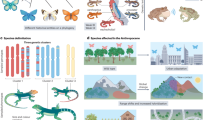Abstract
BELIEVING as I do that the words of a reviewer should be final, it is with no small amount of hesitation that I pen the following few remarks on the review of my little work entitled “Evolution without Natural Selection,” which appeared in NATURE of November 12 (p. 26). The curious way in which my book has been misunderstood, and my consequent endeavour to put matters in a clear and impartial light, must be my apology for taking up your valuable space. In the first place, Mr. Romanes finds fault with the title of my book; but why, it is hard to conjecture. I venture to assert that nine-tenths of the matter it contains attempt to illustrate the operation of evolution without any natural selective process, as any impartial reader must admit; consequently, I absolutely deny that I only reserved a few odds and ends of small detail which I ascribed to other agencies. I might also state that I had a reason, and I think a very good one, in confining my remarks exclusively to birds. Had I elected to cover a wider area, I could have shown that these “odds and ends,” as Mr. Romanes somewhat contemptuously calls them, do not by any means exclusively apply to birds, but to species in every other department of natural history. Mr. Romanes goes on to say that “It is the very essence of the Darwinian hypothesis that it only seeks to explain the apparently purposive variations, or variations of an adaptive kind; and, therefore, if any variations are taken to be non-adaptive, exhypothesi they cannot have been due to natural selection.” Precisely. And it was the immense amount of what I may call non-purposive variation which forms the line of demarcation between such vast numbers of species that I have attempted to explain by other agencies when natural selection utterly fails to do so. I most emphatically deny that I ever said, or even inferred, that these variations are “for the most part rare,” as Mr. Romanes leads the reader of his review to suppose. All naturalists who are in the habit of working through large series of specimens are well aware of the immense number of species whose claim to rank as such is based upon their slight variation from a dominant type. It took me five years' hard work amongst tens of thousands of specimens to arrive at the conclusions expressed in my little book; and, in my opinion, no naturalist is qualified to write on these subjects without serving such an apprenticeship. That is why, as a specialist, I confined myself to birds alone for my examples. In the face of the array of important facts which I endeavoured to chronicle, it seems strange for a naturalist of such standing as Mr. Romanes to state that these facts “may be freely presented to the anti-Darwinians.” Why “anti-Darwinians,” Mr. Romanes? No one but an evolutionist (and most evolutionists are surely Darwinians) would attach any importance to these “trivial variations,” and consequent intergradation of specific forms. Mr. Romanes is careful to point out how Darwin himself admits that if these trivial specific characters are “really of no considerable importance in the struggle for life, they could not be modified or formed through natural selection.” Now probably it is no exaggeration to say that at least one-third of the known recognised species absolutely rest on these “trivial specific characters.” If they have not been evolved by natural selection, I maintain that other and as equally potent agents as natural selection have been at work. The object of my little book was to try and explain them.
This is a preview of subscription content, access via your institution
Access options
Subscribe to this journal
Receive 51 print issues and online access
$199.00 per year
only $3.90 per issue
Buy this article
- Purchase on SpringerLink
- Instant access to the full article PDF.
USD 39.95
Prices may be subject to local taxes which are calculated during checkout
Similar content being viewed by others
Author information
Authors and Affiliations
Rights and permissions
About this article
Cite this article
DIXON, C. “Evolution without Natural Selection”. Nature 33, 100 (1885). https://doi.org/10.1038/033100a0
Issue date:
DOI: https://doi.org/10.1038/033100a0



